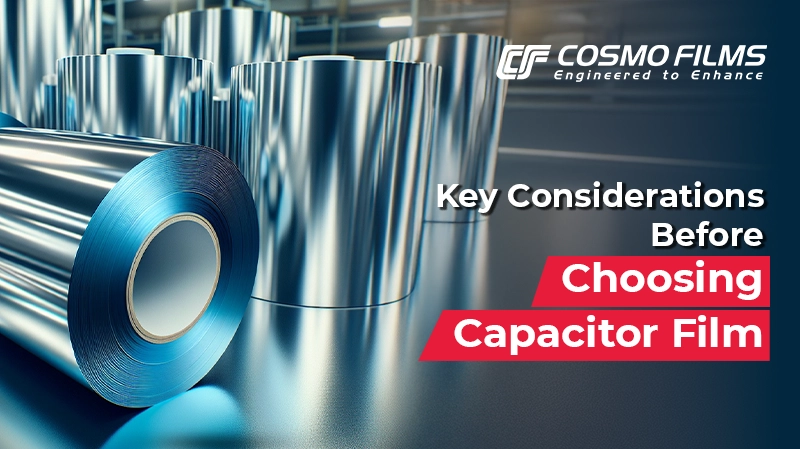Do you know that a capacitor's performance depends greatly on the quality and type of dielectric film used! Choosing the right film is about meeting specifications and optimizing performance, which ensures longevity while delivering a superior product.
Let’s look at the key factors to consider when selecting capacitor polypropylene film for your applications.
- Dielectric Constant : The dielectric constant is a basic property determining a capacitor film's ability to store electrical energy. A higher dielectric constant allows higher capacitance without increasing the component size. So, if your application requires a compact design, pick a capacitor film with higher capacitance as it will help you achieve required capacitance while conserving space.
- Dissipation Factor : The dissipation factor indicates the amount of energy dissipated as heat within the capacitor. A low dissipation factor is essential for high-efficiency applications. The dissipation factor can vary with frequency. Therefore, first understand the operating frequency range of the application and then select a film with minimal losses in that range.
- Breakdown Voltage : The breakdown voltage represents the maximum electrical field a film can withstand before dielectric breakdown occurs. A high breakdown voltage is crucial for applications involving high voltages or transient surges. Applications with high voltage pulses require capacitor polypropylene film with robust breakdown characteristics and the ability to withstand repetitive stress.
- Temperature Range : Capacitors operate in different environments - from scorching industrial settings to freezing aerospace applications. Therefore, considering the operating temperature range of the capacitor film is essential while selecting. Consider the temperature coefficient of capacitance, which indicates how capacitance changes with temperature.
- Mechanical Properties : The polypropylene capacitor film's mechanical properties - tensile strength, elongation, and tear resistance is essential when selecting the film. Films with good tensile strength and elongation are easier to wind and process, thereby reducing manufacturing defects. Applications exposed to vibration or mechanical shock require films with high tear resistance and durability. Consistent film thickness is crucial for uniform performance and reliable breakdown voltage.
- Cost-Effectiveness : Cost is a major factor in any film’s material selection process. Consider the impact of film properties on manufacturing costs. Also, prioritize long-term reliability over short-term cost savings, as a higher-quality film can reduce maintenance costs and extend product lifespan.
- Environmental Considerations : The increasing environmental regulations and sustainability concerns can influence material selection. Therefore, consider the recyclability of film material to make sure the capacitor film complies with relevant environmental regulations.
Partner with a Trusted Manufacturer
Choosing the right capacitor film requires a deep understanding of application requirements. As the best film capacitor manufacturer, we are committed to providing the highest-quality films that deliver maximum performance, reliability, and longevity. Contact us for your capacitor film requirements.
